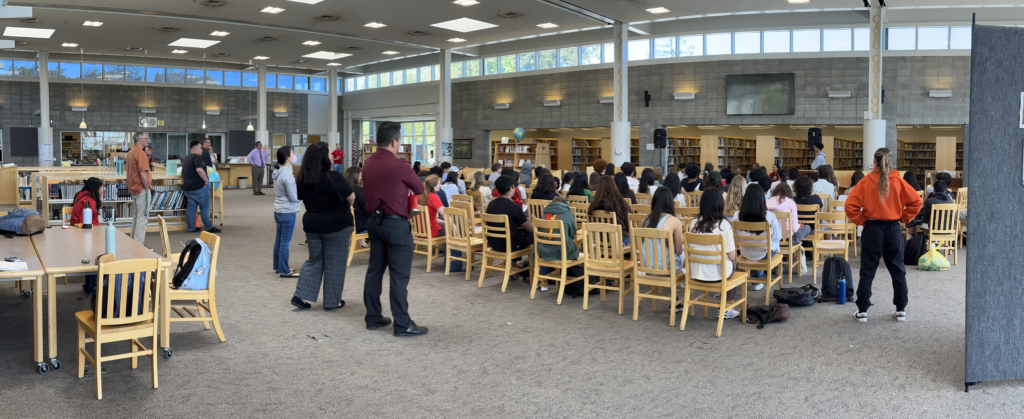Over 100 students and staff members gathered in the library on April 26 to listen to a panel discussion about the implicit and explicit racism experienced by Saratoga’s small African American community.
Students sat in rows facing the panelists, who discussed topics from institutional racism to microaggressions they experienced within and outside of the Saratoga community.
The panelists were sophomore Dylan Wilson, senior Nadine Cobourn and community members Byran Wilson and Tammie Marshall as well as Lindsay Harris, who works in human resources for the district. They described their experiences of racism — ranging from microaggressions to institutional racism. Senior Taylor Wilson, who was the emcee for the event, also spoke about his experiences with racism in high school.
Activities director Kristen Cunningham collaborated with the Anti-Racism Task Force (ARTF), counselor Brian Safine, district director of climate and culture Jamal Splane, assistant principal Matt Torrens as well as the panelists to help plan the event. Cunningham said the administration hopes that this panel will become a recurring event that gives African American community members a chance to share their perspectives.
“The purpose of this event was to provide an opportunity for African American members of our community to share their personal backgrounds and experiences with racism,” Cunningham said. “The administration and planning committee all hoped this event would provide an opportunity for our community to better understand how they can play a role in combating racism at Saratoga High School and our wider community.”
Taylor was originally contacted by Torrens to collaborate on a plan for Diversity Week, which was from April 24-28. Although their original plans were ambitious, the panel was what the group was able to plan with the time they had.
As the emcee, Taylor had less speaking time than panelists but was also able to share his experiences.
“I think I’ve had the opportunity to speak a few times, and I wanted other African American people who haven’t had as many opportunities in our community to be highlighted,” Taylor said. “I wanted to have an event where people could listen to more perspectives.”
For this reason, Taylor pointed to the community member panelists who were able to share their experiences with racism outside of the Saratoga community. Making up slightly more than 0.1% of Saratoga’s community, Black community members’ experiences are often diminished and disregarded.
“I’ve only had experience with racism here,” Taylor said. “I thought it was important for people to get insight about how racism can manifest outside of our community.”
Members of the panel discussed topics like institutional and systemic racism, sharing anecdotes about being discriminated against when seeking medical attention or looking to buy a house. Harris recalled that when she needed medical care, she would worry about her appearance, fearing discrimination if she didn’t look presentable at the hospital.
“Normally, you hear about [instances of blatant racism] on the news or social media, but when you get to hear it from people a few feet away from you, you can understand it better,” Taylor said.
Senior Arshi Chawla, who attended the event, agreed that hearing the perspectives of the panelists was important. Chawla was especially impacted by hearing Byran Wilson speak about how racism could potentially lessen or even end in young people’s lifetimes, due to the normalization of interracial or intercultural marriages and the increasing number of multiracial people.
By speaking out, Dylan’s goal as a panelist was to contribute his perspective to the discussion. Dylan said he feels like the event was important in order for students and staff to hear about the African American experience.
“I wanted people to understand that the African American experience is different from that of the average person,” he said. “I hoped people could leave the event with a better understanding of the experience and the harm that microaggressions can cause.”


























